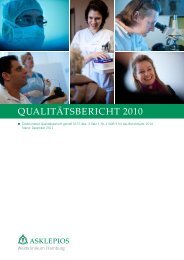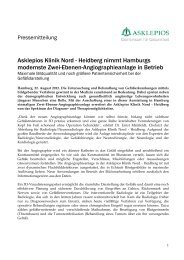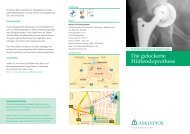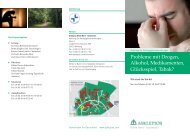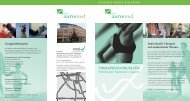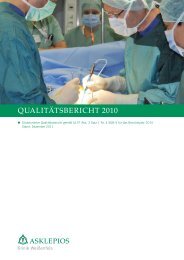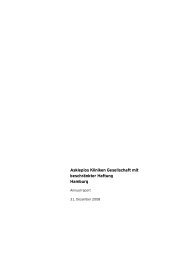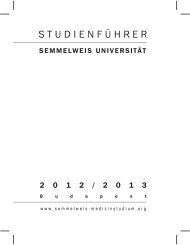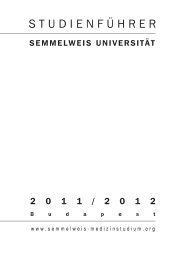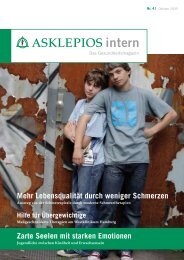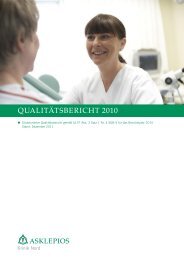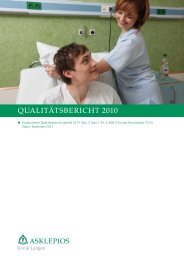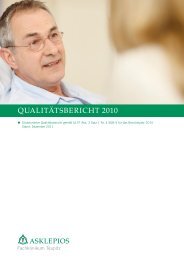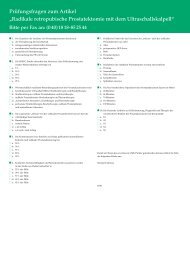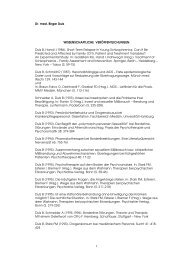Download Sammelmappe - Asklepios
Download Sammelmappe - Asklepios
Download Sammelmappe - Asklepios
Sie wollen auch ein ePaper? Erhöhen Sie die Reichweite Ihrer Titel.
YUMPU macht aus Druck-PDFs automatisch weboptimierte ePaper, die Google liebt.
Consequences of Aging Deprive Monica of Her Independence<br />
on others. Others felt that being part of<br />
a diverse community would help them<br />
satisfied with their lives, less optimistic,<br />
and generally in a poorer state of health<br />
(Spain) After her husband died, Monica §<br />
chose to live alone. Much of her retirement was spent<br />
volunteering at a national non-profit organization where she would organize trips and holidays for<br />
groups of seniors. Monica says, “everything was perfect until I hit 80, then everything started going<br />
wrong.” A bad fall finally persuaded her to accept the offer of a room with her daughter, a hospital<br />
nurse and her houseful of teenagers. Though she likes her family, Monica is not happy with this turn<br />
of events as she feels a guest in the house, as if she is imposing. When the family gathers around<br />
the TV in the evening, she makes sure she goes to her bedroom so they have some privacy.<br />
develop the flexibility and strength that<br />
would be the basis for their independence.<br />
than those with rich social networks.<br />
Still others framed independence in terms<br />
of not relying on anyone but a spouse<br />
for practical or financial help. In all cases,<br />
elders seemed wary of technologies that<br />
would lessen their perception of control.<br />
Intel’s research also pointed to a few<br />
differences between the United States and<br />
Europe that influence social connectedness.<br />
For example, the elderly in the United States<br />
Loss of access to a good public transport system and a reliance on others for lifts has left Monica<br />
feeling isolated and dependent. Furthermore, she is aware of her old activities and identities being<br />
stripped away. ‘Now our relationship has changed – she treats me like a daughter now. Checks on<br />
things like what I am wearing when I go out or my personal cleanliness.’ What Monica’s family hasn’t<br />
told her is that she has been diagnosed with Alzheimer’s disease. She was taken for tests after<br />
having to give up her volunteering work due to spells of disorientation and forgetfulness. She now<br />
spends much of her time at a day centre where she greatly enjoys doing crosswords, painting and is<br />
trying to put together a cookbook.<br />
tend to live in more urban areas, where as<br />
the elderly in Europe live in more remote<br />
Intel’s research found that the social<br />
services support in Europe was much<br />
more comprehensive and available than<br />
social services offered in the United States,<br />
leading to the conclusion that the elderly in<br />
Europe were better equipped to maintain<br />
their independence based on this support.<br />
locations. The research also revealed<br />
that the elderly in the United States<br />
were better connected via technology,<br />
such as broadband Internet connections,<br />
than those in Europe. Therefore, those<br />
in the United States were more likely<br />
§ The names and certain details have been changed to preserve confidentiality.<br />
to be socially connected through their<br />
communities and through technology<br />
4. Balancing Adaptive Denial and<br />
Realistic Awareness<br />
Many older adults in our research study<br />
were in a state of adaptive denial about<br />
the negative impacts of aging. Adaptive<br />
denial is a positive coping mechanism<br />
acquired by the elderly or those with<br />
terminal illness. Research shows a definite<br />
link between optimism and good health.<br />
However, successful aging involves a<br />
balance between adaptive denial and<br />
realistic awareness of the possibility of<br />
cognitive impairment and other health<br />
problems related to aging. Denial often<br />
delays awareness of cognitive or physical<br />
than the elderly in Europe. However, the<br />
U.S. elderly was found to be less socially<br />
On the one hand, people said that they<br />
wish they’d had more advance warning of a<br />
decline—awareness that might have led to<br />
early detection and treatment of illness.<br />
Instead, the elders’ level of functioning is<br />
overestimated until a catastrophic event<br />
occurs—an increasingly frail parent falls in<br />
her home, or a dementia patient gets lost.<br />
connected to their families because<br />
U.S. families are more geographically<br />
loved one’s illness, so they could make better<br />
decisions, prevent health crises, prolong the<br />
dispersed than those in Europe.<br />
elders’ independence, and seek treatment<br />
while it could still have some benefit. On<br />
the other hand, they acknowledged having<br />
overlooked or trivialized many early signs<br />
that something was seriously wrong.<br />
Most of the people in the research endorse<br />
the concepts of early detection and<br />
prevention of illness, but when it comes to<br />
their own health, the majority of participants<br />
were conflicted about proactively seeking<br />
detection. This balance between awareness<br />
and denial surfaced in almost every story.<br />
3. Maintaining Independence<br />
To varying degrees, all of the older adults<br />
we met in the course of our research<br />
expressed concerns about losing control<br />
and independence. For some people,<br />
the physical home was a stand-in for<br />
independence; they felt that as long as<br />
they could live in their homes, they could<br />
tolerate other concessions of dependence<br />
4



